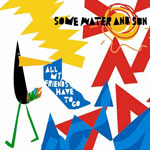

Some Water And Sun
All My Friends Have To Go
(Hefty)
Some Water And Sun is the newest project from Slicker main-man and Hefty Records founder John Hughes III. On the project, he collaborates with Japanese artist Shin Tasaki (of the group Spanova) and the result is a slab of something that mixes a bit of microhouse with a touch of R&B along with a touch of summery pop and a dash of soul. Hughes first became aware of Tasaki when he sent a demo of his groups work to the Hefty offices, and the two stayed in touch after that, eventually culminating in the project together.
In talking about the project, the two have joked that it was a release that was about Tasaki trying to be more American and Hughes trying to be more Japanese, and the result is something that manages to sound unique in a genre cluttered with releases. The production quality is crisp and hyper-clean, continuing on from the last Slicker album We All Have A Plan, and in working with less people Hughes seems a little more comfortable and confident with his production and songcraft this time around.
After a short introduction, the album kicks off with "Snowbreaker," which is also the first single from the release. Mixing staccato melodies and rhythms, the track bumps along in a stutter-stepping way while the breathy vocals of Tasaki provide the only real organic and solid foundation to things. "Blossom" romps along with more blurping analog synth melodies and clicky rhythms (with stray drum machine hi-hats) while Tasaki turns in a more rhythmic vocal presence and is joined by Yukie on some nice harmonies.
Those hoping for more smooth-as-butter electronic R&B stylings ala Jamie Lidell will find themselves probably at least a little bit overwhelmed by the jumpy cuts and unique song structures on All My Friends Have To Go. The warm breakbeats, rounded off acid synths and call-and-response vocals of the title track "All My Friends Have To Go" is about as lean as the album gets, with most other tracks working off-kilter time signatures and unique vocal contributions from Tasaki that range from crooning to almost spoken word (and even include some filtered, chipmunk-style work on "See You Next Spring") manage to keep you guessing at least a bit. All that said, it's also an album that isn't exactly inviting all the time. The jumpy rhythms and weird song structures don't exactly make for sing-along material, but at the same time might wake up your joints in places you remember you had them.
Rating: 6.5